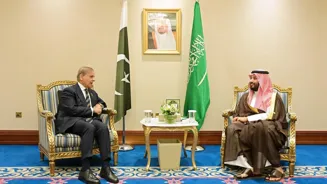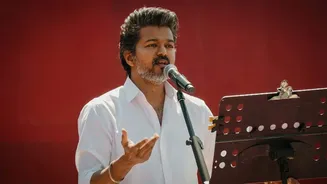Pakistan and Saudi Arabia on Wednesday signed a defence pact under which any aggression against either country shall be considered as an act of aggression against both.
The pact, which promises to deepen military cooperation between Islamabad and Riyadh, raises fresh questions for regional calculus, given India's expanding strategic and economic ties with Riyadh. The 'Strategic Mutual Defence Agreement' was signed during Pakistan's Prime Minister Shehbaz Sharif's state visit to Riyadh. A statement from Sharif's office announced the signing of the pact, reported Dawn newspaper, adding that the agreement states that any aggression against either country shall be considered an act of aggression against both. "Building on a partnership extending nearly eight decades, and grounded in bonds of brotherhood, Islamic solidarity and shared strategic interests, the two sides signed the Strategic Mutual Defence Agreement," a joint statement released after the signing ceremony said, as reported by PTI. "It aims to develop defence cooperation further and strengthen joint deterrence against any aggression. Crucially, the agreement stipulates that any aggression against one country shall be considered aggression against both," the Geo News reported.
Pak-Saudi Defence Pact: A Worry For India?
The recent defence pact between Pakistan and Saudi Arabia is a significant elevation of defence cooperation between the two countries. For India, the development is likely to be watched closely as Saudi Arabia, in recent years, has sought closer economic and strategic ties with New Delhi and its defence commitment to Pakistan, India’s immediate neighbour and rival, could create new complexities in South Asia.
However, if the pact remains a symbolic reaffirmation of 'brotherly ties' or evolves into joint exercises, intelligence sharing, or even coordinated defence posturing in the region, it is yet to be known.
Islamabad's defence pact with Riyadh risks "pulling Saudi Arabia into confrontation with India, with which Pakistan has fought four major wars," reported Bloomberg.
The pact could shift the strategic calculus in a complex region, Reuters reported. The news agency quoted a senior Saudi official acknowledging the need to balance relations with India. "Our relationship with India is more robust than it has ever been. We will continue to grow this relationship and seek to contribute to regional peace whichever way we can," the senior Saudi official told Reuters on the condition of anonymity.
Pakistan's Recent West Asia Outreach
Within a week, Pakistan's Prime Minister Shehbaz Sharif has visited three nations in the Gulf region. He earlier visited Qatar twice, on Thursday and Monday, to express solidarity with Doha following Israel's attack on the Hamas leadership in the Gulf country and to attend an emergency meeting of Arab-Islamic nations on the issue. Sharif then visited Saudi Arabia where he was received by Riyadh Deputy Governor Muhammad bin Abdulrahman bin Abdulaziz.
(With agency inputs)













